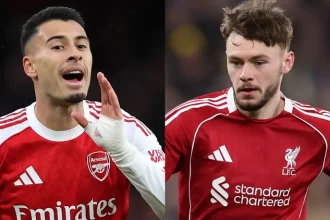Reigning Premier League champions, Liverpool, have announced a £46m pre-tax loss for the financial year ending May 2020.
The Merseysiders made the disclosure in a statement released on the club’s official website on Tuesday, April 27.
Asides from the £46m loss before tax, Liverpool announced that its media revenue went down by £59m to £202m while its matchday revenue dropped by £13m to £71m.
While the overall revenue experienced a drop by £43m to £490m, the club said that its commercial revenue went up by £29m to £217m.
Liverpool filed its consolidated financial accounts amidst its failed plans to join a closed league, the ill-fated European Super League, having received numerous backlash for joining the plans.
The clubs said the downturn was as a result of the impact of COVID-19 which saw the initial suspension of in March 2020 and then resumed behind closed doors with no supporters in attendance
Matchday revenue was down by £13m to £71m as a result of four fewer Premier League home games during this period. Likewise, media revenue reduced by £59m to £202m due to the Premier League season-extending outside of the reporting financial period, completing in July 2020.
Despite the reductions in media and matchday revenues, the club reported an increase of £29m to £217m in commercial revenue. Eight new partnerships were announced in this period, including Cadbury and Iugis. Nivea and Carlsberg also renewed their existing long-term partnerships with the club.
LFC Retail experienced a significant increase in growth, with the Premier League champions’ home kit breaking record sales. The club’s international expansion plans also added growth with new retail stores opened in Thailand, Singapore and Vietnam.
Digitally, the club saw a huge growth in its global social media following – up 32 per cent annually, gaining an additional 22m new followers. LFC remains the most-followed Premier League club on YouTube and is the fastest-growing club on Instagram. The club’s combined Twitter accounts reached 17.4m followers – a 29 per cent increase and treble the growth rate recorded in the 2018-19 season.
“This financial reporting period was up to May 2020 so approaching a year ago now,” said managing director Andy Hughes.
“It does, however, begin to demonstrate the initial financial impact of the pandemic and the significant reductions in key revenue streams.
“We were in a solid financial position prior to the pandemic and since this reporting period we have continued to manage our costs effectively and navigate our way through such an unprecedented period.
“We can now look ahead to the conclusion of this season and hopefully a more normal start to next season.
“It’s no secret that supporters have been greatly missed at Anfield over the past year and we look forward to having them back.”











